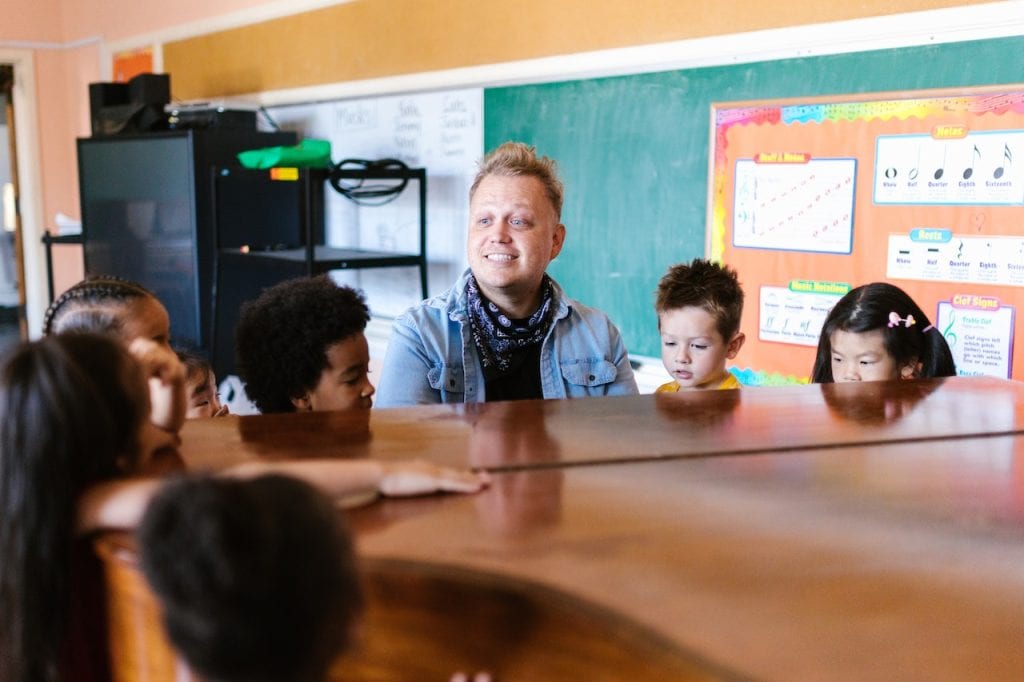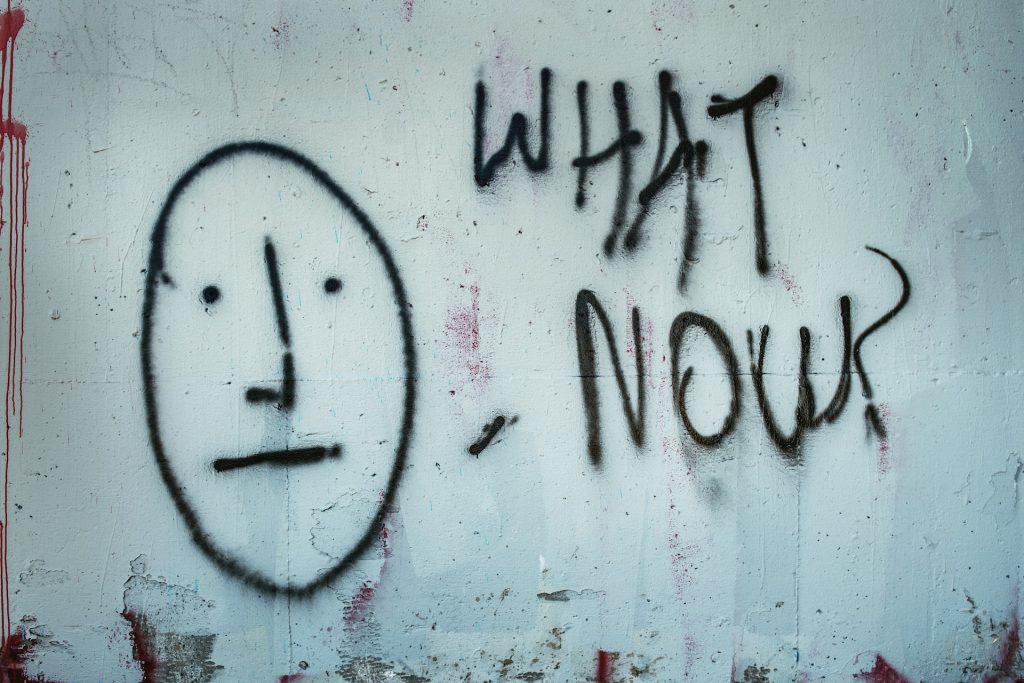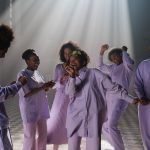Five Questions to Ask After the Choir Concert
I love a good post-concert debrief. As musicians, it is often so easy to just jump into the next cycle or the next project. However, I’ve found that it’s in the reflecting on our work that my students and I are able to learn from our experiences and grow together. Over time, I have come to use the following five questions to ask after the choir concert as a framework to help guide productive conversations with my ensembles.
- What went well?
- What might we do differently next time?
- How have we grown this concert cycle?
- Who do we have to thank?
- What’s next?
Below, I dig a bit deeper into each of these five questions to ask after the choir concert, providing follow up questions and discussion prompts. Teachers, want to use these questions with your students? I have a worksheet just for you below!

Reflecting Is A Group Effort!
In the rush to the end of the concert cycle, it is sometimes hard to pause and take a moment to reflect on the triumphs and challenges we have encountered along the way. Just as preparing for and presenting a concert is a group effort, so should reflecting on the concert.
Not only does involving the whole ensemble in the reflecting effort build independent musicianship skills, but it also encourages singers to take ownership in the direction of the ensemble. Here are five of my favorite questions to ask ensembles following our choir concerts:
What Went Well?
As a musician, it is hard for me to turn off that nit-picky pre-concert fix-everything mentality. Following a concert, though, it is so important to focus on the positives first. We need to celebrate our successes as an ensemble and allow others to point out positive moments that we might have missed in the hustle of the concert.
A few follow-up questions might include:
- What song went better than it ever has before?
- What positive feedback did you receive from family or friends in the audience?
- Who are you really proud of in our ensemble?
- How did we come together as an ensemble to fix XYZ mistake or stumble that happened?
- What performances did you enjoy from other ensembles?

What Might We Do Differently Next Time?
Rather than asking what our weaknesses were, I prefer to ask the ensemble what we might do differently if we were to perform this concert again. I have found this subtle change in wording makes the world of difference in the attitude of the reflection. Rather than focusing on the things that went wrong, the ensemble is able to focus on the skills and knowledge they have to fix the issues they encountered.
To dig deeper into things the ensemble might do differently, consider using some of these follow-up questions:
- How did we portray the dynamics and musical expressions with each piece?
- Did the order of the concert serve the message well?
- How secure were we with our lyrics? Harmonies? Knowledge of the road-map of the piece?
- Did we tell the stories we set out to share?
- Was there any negative feedback? How might we address this in the future?
If time allows, I especially love asking an ensemble to perform a piece then and there with their proposed changes. Sometimes I will invite them to record their final performance of the piece to share with friends and families. If the ensemble knows they can be successful, why keep that success at bay? This helps to reinforce the idea that no one performance is more or less important than the others.
How Have We Grown This Concert Cycle?
Sometimes in our reflections we focus so much on the progress of music that we forget to consider our progress as musicians. Some follow-up questions to ask after the choir concert about growth include:
- Where were we individually or as an ensemble at the beginning of the cycle or at the beginning of the year? How does that compare to where we are now?
- How has our musicianship grown? What about our rehearsals or repertoire encouraged this growth?
- How has our responsiveness to each other grown? (Singer to singer, singer to conductor, conductor to ensemble?)
- Who has shown the most growth this cycle? Why? Let’s celebrate them!
- What about this cycle pushed us individually or as an ensemble? (Or on the flip side, what about this cycle didn’t challenge us or promote growth?)

Who Do We Have to Thank?
It takes a team of people to successfully produce a choir concert. With my choirs, reflection days are also thank-you message days, acknowledging as many of these people as we can.
Here are a few post-concert thank-you ideas:
- Singers sign a card thanking production team, accompanist, guest artists, etc.
- Singers send a brief text thanking someone who attended the concert and letting them know how much their support meant to them.
- Singers send a short email or make a card for a music teacher who has helped them get to this point in their music career.
- Social media team posts an image of the concert, giving specific thanks to individuals who helped.
- Singers shout-out thanks to individuals in the choir who have made this cycle special.
What’s Next?
My favorite part of the reflection day is the “what’s next” discussion. The answers from this portion of the discussion help me to be a more responsive and engaging educator and give singers ownership in their ensemble. I like to focus on two areas here: programming ideas and teaching/learning approaches.
Programming Ideas
I am more invested in an ensemble when I think my opinions and preferences matter. If I like the music we are singing, I generally am more excited to go to and participate in choir. I’d guess that many singers share this same attitude. This is why I love to ask my students for programming ideas to get my programming wheels turning.
Here are a few questions I ask to guide the conversation:
- What was your favorite piece this year/cycle? Why?
- What genres or styles were your favorite to perform? Why?
- Do you have any songs in particular you would like to perform next cycle/year?
- Complete the sentence: I would like to perform something like ___(insert song name)___.
- Are there any languages, cultures, or eras you would like us to explore next year?
- Do you have ideas for themes you would like to explore?
I make it clear in these conversations that I will not be able to honor every single request that is made. I also make it clear to the singers that I value their ideas and opinions and will do my best to create for them an engaging and meaningful program.
Teaching/learning approaches
One of the most important questions I can ask my singers is “What can I as a teacher do to better support your learning?” Early on in my career I felt like I needed to figure out what made my students tick as if they were some sort of puzzle. Now I know – it’s much easier to just ask them, learn from them, and put that knowledge to good use.
Questions we might ask to help ourselves better serve our singers include:
- What resources do you need to feel (more) successful?
- How was the pacing of learning this concert cycle?
- Did you feel challenged by the repertoire and technique studied this concert cycle?
- Was the environment of the classroom or your sections supportive?
- What have we not addressed in class about singing, technique, or repertoire that interests you?
Often times it’s hard to ask these questions, because they might expose weaknesses or open up the conversation to difficult critiques. For me, that makes them all the more important to ask.

I’d Love to Hear from You!
Have you had any of these after the choir concert discussions with your ensemble? How did the questions to ask after the choir concert guide your conversations? What other questions do you love to ask after the choir concert is over? Let me know in the comments section below!
Free Concert Reflection Worksheet
Join my email list below and get my concert listening worksheet free!
Enjoying the Inspiration?
I have more Take Five For Inspiration Posts for you! Take a look:
- Five Lessons for After the Choir Concert
- Five Breathing Exercises for Choir Singers
- Five Tips for Practicing Your Choir Music















